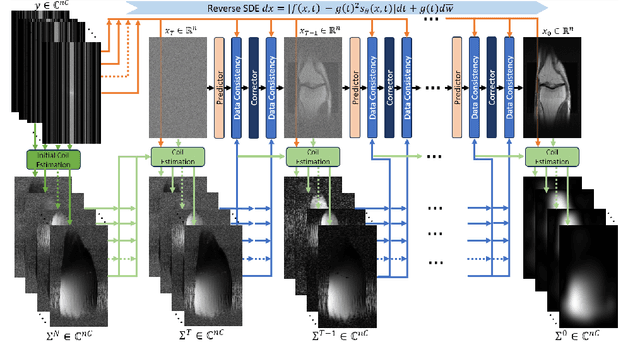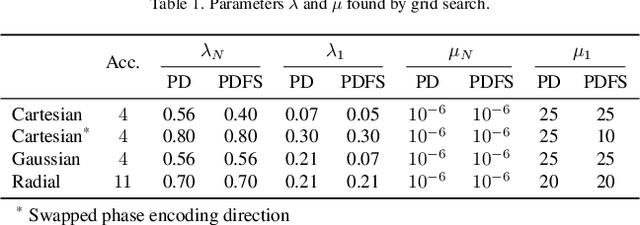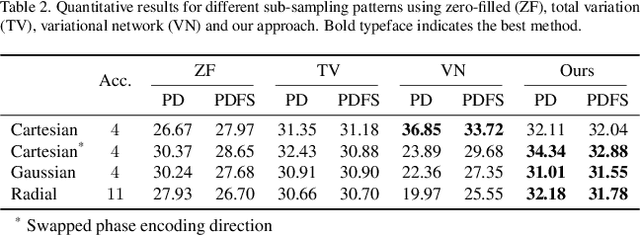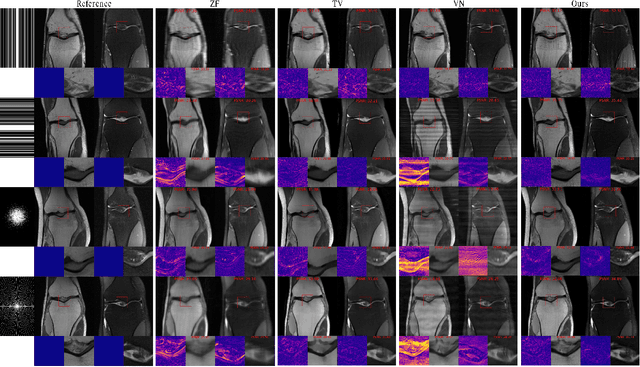Martin Zach
Learning Regularization Functionals for Inverse Problems: A Comparative Study
Oct 02, 2025Abstract:In recent years, a variety of learned regularization frameworks for solving inverse problems in imaging have emerged. These offer flexible modeling together with mathematical insights. The proposed methods differ in their architectural design and training strategies, making direct comparison challenging due to non-modular implementations. We address this gap by collecting and unifying the available code into a common framework. This unified view allows us to systematically compare the approaches and highlight their strengths and limitations, providing valuable insights into their future potential. We also provide concise descriptions of each method, complemented by practical guidelines.
A Statistical Benchmark for Diffusion Posterior Sampling Algorithms
Sep 16, 2025Abstract:We propose a statistical benchmark for diffusion posterior sampling (DPS) algorithms for Bayesian linear inverse problems. The benchmark synthesizes signals from sparse L\'evy-process priors whose posteriors admit efficient Gibbs methods. These Gibbs methods can be used to obtain gold-standard posterior samples that can be compared to the samples obtained by the DPS algorithms. By using the Gibbs methods for the resolution of the denoising problems in the reverse diffusion, the framework also isolates the error that arises from the approximations to the likelihood score. We instantiate the benchmark with the minimum-mean-squared-error optimality gap and posterior coverage tests and provide numerical experiments for popular DPS algorithms on the inverse problems of denoising, deconvolution, imputation, and reconstruction from partial Fourier measurements. We release the benchmark code at https://github.com/zacmar/dps-benchmark. The repository exposes simple plug-in interfaces, reference scripts, and config-driven runs so that new algorithms can be added and evaluated with minimal effort. We invite researchers to contribute and report results.
Energy-based models for inverse imaging problems
Jul 16, 2025Abstract:In this chapter we provide a thorough overview of the use of energy-based models (EBMs) in the context of inverse imaging problems. EBMs are probability distributions modeled via Gibbs densities $p(x) \propto \exp{-E(x)}$ with an appropriate energy functional $E$. Within this chapter we present a rigorous theoretical introduction to Bayesian inverse problems that includes results on well-posedness and stability in the finite-dimensional and infinite-dimensional setting. Afterwards we discuss the use of EBMs for Bayesian inverse problems and explain the most relevant techniques for learning EBMs from data. As a crucial part of Bayesian inverse problems, we cover several popular algorithms for sampling from EBMs, namely the Metropolis-Hastings algorithm, Gibbs sampling, Langevin Monte Carlo, and Hamiltonian Monte Carlo. Moreover, we present numerical results for the resolution of several inverse imaging problems obtained by leveraging an EBM that allows for the explicit verification of those properties that are needed for valid energy-based modeling.
The Gaussian Latent Machine: Efficient Prior and Posterior Sampling for Inverse Problems
May 19, 2025Abstract:We consider the problem of sampling from a product-of-experts-type model that encompasses many standard prior and posterior distributions commonly found in Bayesian imaging. We show that this model can be easily lifted into a novel latent variable model, which we refer to as a Gaussian latent machine. This leads to a general sampling approach that unifies and generalizes many existing sampling algorithms in the literature. Most notably, it yields a highly efficient and effective two-block Gibbs sampling approach in the general case, while also specializing to direct sampling algorithms in particular cases. Finally, we present detailed numerical experiments that demonstrate the efficiency and effectiveness of our proposed sampling approach across a wide range of prior and posterior sampling problems from Bayesian imaging.
Product of Gaussian Mixture Diffusion Model for non-linear MRI Inversion
Jan 15, 2025



Abstract:Diffusion models have recently shown remarkable results in magnetic resonance imaging reconstruction. However, the employed networks typically are black-box estimators of the (smoothed) prior score with tens of millions of parameters, restricting interpretability and increasing reconstruction time. Furthermore, parallel imaging reconstruction algorithms either rely on off-line coil sensitivity estimation, which is prone to misalignment and restricting sampling trajectories, or perform per-coil reconstruction, making the computational cost proportional to the number of coils. To overcome this, we jointly reconstruct the image and the coil sensitivities using the lightweight, parameter-efficient, and interpretable product of Gaussian mixture diffusion model as an image prior and a classical smoothness priors on the coil sensitivities. The proposed method delivers promising results while allowing for fast inference and demonstrating robustness to contrast out-of-distribution data and sampling trajectories, comparable to classical variational penalties such as total variation. Finally, the probabilistic formulation allows the calculation of the posterior expectation and pixel-wise variance.
Bigger Isn't Always Better: Towards a General Prior for Medical Image Reconstruction
Jan 13, 2025Abstract:Diffusion model have been successfully applied to many inverse problems, including MRI and CT reconstruction. Researchers typically re-purpose models originally designed for unconditional sampling without modifications. Using two different posterior sampling algorithms, we show empirically that such large networks are not necessary. Our smallest model, effectively a ResNet, performs almost as good as an attention U-Net on in-distribution reconstruction, while being significantly more robust towards distribution shifts. Furthermore, we introduce models trained on natural images and demonstrate that they can be used in both MRI and CT reconstruction, out-performing model trained on medical images in out-of-distribution cases. As a result of our findings, we strongly caution against simply re-using very large networks and encourage researchers to adapt the model complexity to the respective task. Moreover, we argue that a key step towards a general diffusion-based prior is training on natural images.
GMM-IKRS: Gaussian Mixture Models for Interpretable Keypoint Refinement and Scoring
Aug 30, 2024



Abstract:The extraction of keypoints in images is at the basis of many computer vision applications, from localization to 3D reconstruction. Keypoints come with a score permitting to rank them according to their quality. While learned keypoints often exhibit better properties than handcrafted ones, their scores are not easily interpretable, making it virtually impossible to compare the quality of individual keypoints across methods. We propose a framework that can refine, and at the same time characterize with an interpretable score, the keypoints extracted by any method. Our approach leverages a modified robust Gaussian Mixture Model fit designed to both reject non-robust keypoints and refine the remaining ones. Our score comprises two components: one relates to the probability of extracting the same keypoint in an image captured from another viewpoint, the other relates to the localization accuracy of the keypoint. These two interpretable components permit a comparison of individual keypoints extracted across different methods. Through extensive experiments we demonstrate that, when applied to popular keypoint detectors, our framework consistently improves the repeatability of keypoints as well as their performance in homography and two/multiple-view pose recovery tasks.
Joint Non-Linear MRI Inversion with Diffusion Priors
Oct 23, 2023



Abstract:Magnetic resonance imaging (MRI) is a potent diagnostic tool, but suffers from long examination times. To accelerate the process, modern MRI machines typically utilize multiple coils that acquire sub-sampled data in parallel. Data-driven reconstruction approaches, in particular diffusion models, recently achieved remarkable success in reconstructing these data, but typically rely on estimating the coil sensitivities in an off-line step. This suffers from potential movement and misalignment artifacts and limits the application to Cartesian sampling trajectories. To obviate the need for off-line sensitivity estimation, we propose to jointly estimate the sensitivity maps with the image. In particular, we utilize a diffusion model -- trained on magnitude images only -- to generate high-fidelity images while imposing spatial smoothness of the sensitivity maps in the reverse diffusion. The proposed approach demonstrates consistent qualitative and quantitative performance across different sub-sampling patterns. In addition, experiments indicate a good fit of the estimated coil sensitivities.
Product of Gaussian Mixture Diffusion Models
Oct 19, 2023Abstract:In this work we tackle the problem of estimating the density $ f_X $ of a random variable $ X $ by successive smoothing, such that the smoothed random variable $ Y $ fulfills the diffusion partial differential equation $ (\partial_t - \Delta_1)f_Y(\,\cdot\,, t) = 0 $ with initial condition $ f_Y(\,\cdot\,, 0) = f_X $. We propose a product-of-experts-type model utilizing Gaussian mixture experts and study configurations that admit an analytic expression for $ f_Y (\,\cdot\,, t) $. In particular, with a focus on image processing, we derive conditions for models acting on filter-, wavelet-, and shearlet responses. Our construction naturally allows the model to be trained simultaneously over the entire diffusion horizon using empirical Bayes. We show numerical results for image denoising where our models are competitive while being tractable, interpretable, and having only a small number of learnable parameters. As a byproduct, our models can be used for reliable noise estimation, allowing blind denoising of images corrupted by heteroscedastic noise.
Explicit Diffusion of Gaussian Mixture Model Based Image Priors
Feb 16, 2023Abstract:In this work we tackle the problem of estimating the density $f_X$ of a random variable $X$ by successive smoothing, such that the smoothed random variable $Y$ fulfills $(\partial_t - \Delta_1)f_Y(\,\cdot\,, t) = 0$, $f_Y(\,\cdot\,, 0) = f_X$. With a focus on image processing, we propose a product/fields of experts model with Gaussian mixture experts that admits an analytic expression for $f_Y (\,\cdot\,, t)$ under an orthogonality constraint on the filters. This construction naturally allows the model to be trained simultaneously over the entire diffusion horizon using empirical Bayes. We show preliminary results on image denoising where our model leads to competitive results while being tractable, interpretable, and having only a small number of learnable parameters. As a byproduct, our model can be used for reliable noise estimation, allowing blind denoising of images corrupted by heteroscedastic noise.
 Add to Chrome
Add to Chrome Add to Firefox
Add to Firefox Add to Edge
Add to Edge